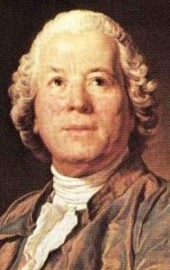Christoph Willibald (von) Gluck
(also "Ritter von Gluck" or "Chevalier de Gluck" - Titles used by himself after 1756 in which he was made a Knight of the Golden Spur by Pope Benedict XIV.)
(July 2, 1714 - November 15, 1787)
was a German composer, one of the most important opera composers of the Classical music era, particularly remembered for Orfeo ed Euridice (A treatment of the story of the legendary musician Orpheus and his journey to the Underworld to bring back again his beloved Euridice, an ancient illustration of the power of music.) He is also remembered as the music teacher of Marie-Antoinette who as Queen of France promoted Gluck and was his patron.
Being the son of a forester (in the Upper Palatinate -now the western extreme of Czechoslovakia-), Gluck was born in Erasbach, Bavaria, Germany. At about 14 he left home to study music in Prague and travelled throughout many cities, Vienna, London, Paris, Rome, Dresden, Copenhagen, Naples. as one of the greatest musicians of the time.
By his own words,
". My father had brought me up to follow in his footsteps as a forester in Bohemia.
One fine day, with only a few groschen (penny) in my pocket,
inflamed with a passion for this art of music,
I secretly left my parents' house and all thoughts of a forester's life behind,
and wandered in a roundabout way towards Vienna.
I earned my food and lodging with my singing. On Sundays and holidays I would play in the village churches."
Some regard him as the father of the Rococo and Classical age of music---at least in Opera.
Gluck's operatic reforms, eliminating all that was undramatic, were a turning point in the history.
Gluck's musical legacy was around 35 complete operas, together with numerous ballets and instrumental works. His reforms influenced Mozart, particularly his opera Idomeneo (1781). Gluck left behind a flourishing school of disciples in Paris, who would dominate the French stage throughout the Revolutionary and Napoleonic period. As well as Salieri, they included Sacchini, Cherubini, Méhul and Spontini. Gluck's greatest French admirer would be Hector Berlioz, whose epic Les Troyens may be seen as the culmination of the Gluckian tradition. Though Gluck wrote no operas in German, his example influenced the German school of opera, particularly Weber and Wagner , whose concept of music drama was not so far removed from Gluck's own.
- - - - - - - - - - - - - - - - - - - - - - - - - - - - - - - - - - - - - - - - - - - - - - - - - - - - -
Stage Works
Artaserse, Milan 26 December 1741
Demetrio, Venice 2 May 1742
Demofoonte, Milan 6 January 1743
Tigrane, Crema 26 September 1743
Sofonisba (or Siface), Milan 18 January 1744
La finta schiava, Venice 13 May 1744
Ipermestra, Venice 21 November 1744
Poro, Turin 26 December 1744
Ippolito, Milan 31 January 1745
La caduta de' Giganti Haymarket Theatre, London 7 January 1746
Artamene, Haymarket Theatre, London 4 March 1746
Le nozze d'Ercole e d'Ebe Pillnitz 29 June 1747
La Semiramide riconosciuta, Aachen 5 May 1748
La contesa de' Numi Charlottenburg 9 April 1749
Ezio Prague 26 December 1749
Issipile Prague 1751-1752
La clemenza di Tito, Naples 4 November 1752
Le Cinesi, Vienna, 24 September 1754
La Danza, Vienna, 5 May 1755
L'innocenza giustificata, Vienna, 8 December 1755
Antigono, Rome, 9 February 1756
Il rè pastore, Vienna, 8 December 1756
La fausse esclave, Vienna, 8 January 1758
L'ile de Merlin, ou Le monde renversé, Vienna, 3 October 1758
La Cythère assiégée, Vienna, early 1759
Le diable à quatre, ou La double métamorphose 1759
L'arbre enchanté, ou Le tuteur dupé 1759
L'ivrogne corrigé, Vienna, April 1760
Tetide, Vienna, 10 October 1760
Don Juan (ballet), Vienna, 17 October 1761
Le cadi dupé, Vienna, 9 December 1761
Orfeo ed Euridice, Vienna 5 October 1762, revised Paris 2 August 1774
Il trionfo di Clelia, Bologna, 14 May 1763
La rencontre imprévue, Vienna, 7 January 1764
Il Parnaso Confuso, Vienna, 24 January 1765
Telemaco, o sia l'isola di Circe, Vienna, 30 January 1765
La Corona (unperformed, planned for 4 October 1765)
Il Prologo, 1767 (introductory music for an opera by Traetta)
Alceste, Vienna 26 December 1767, revised Paris 23 April 1776
Le Feste d'Apollo, Parma, 24 August 1769
Paride ed Elena, Vienna 3 November 1770
Iphigénie en Aulide, Paris 19 April 1774
Armide, Paris 23 September 1777
Iphigénie en Tauride, Paris 18 May 1779
Echo et Narcisse, Paris 24 September 1779
- - - - - - - - - - - - - - - - - - - - - - - - - - - - - - - - - - - - - - - - - - - - - - - - - - - - -
"Gluck's imagination is immense.
The confines of all national music are thus too narrow for him: out of Italian and French and German styles of music,
out of that of every people,
he has made a music that is his own;
or rather,
he has sought in nature all the sounds of true expression and conquered them for himself."
Quoted from J.A. Hiller about Gluck, "Wochentliche Nachrichten" (24th October 1768)
- - - - - - - - - - - - - - - - - - - - - - - - - - - - - - - - - - - - - - - - - - - - - - - - - - - - -
